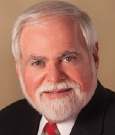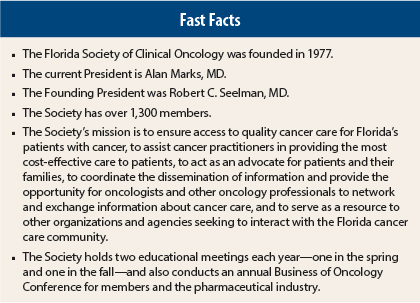The Florida Society of Clinical Oncology (FLASCO) was founded in 1977, just 13 years after the founding of ASCO. Today, the Society has had such an impact on the practices of medical, radiation, surgical, gynecologic, and pediatric oncologists throughout the state, membership has risen to over 1,300—approximately 70% of all cancer specialists in the state of Florida are FLASCO members—and now includes nurse practitioners and physician assistants and other health-care professionals as well.
In addition to being among the oldest and largest of ASCO’s State Affiliates, FLASCO is among the most active legislatively and was influential in securing passage of major legislation, including Florida’s Oral Chemotherapy Parity Law, which went into effect in July. FLASCO was also instrumental in securing funding for the Bankhead-Coley Cancer Research Program, which awards grants to Florida-based universities and research institutions investigating prevention strategies and cures for cancer.
FLASCO is the recipient of three ASCO State Affiliate Grants. Two grants, one in 2005 and one in 2007, were to help in the development and continuation of its initiative, the Florida Clinical Trials Network (FCTN). FCTN increases patient accrual in cancer clinical trials throughout the state. And in 2006, FLASCO received an ASCO State Affiliate Grant to implement an annual statewide conference for physician assistants and nurse practitioners.
The ASCO Post talked with FLASCO President Alan R. Marks, MD, a hematologist/oncologist with 21st Century Oncology and Baptist Health, Jacksonville, about the Society’s biggest challenges and its goals for the future.
Mutually Beneficial Partnership
Why was it important for FLASCO to become an ASCO State Affiliate and have its own oncology society?
FLASCO was formed with the assistance of the Florida Division of the American Cancer Society. At the time, ASCO was focused on increasing membership and FLASCO was determined to maintain its existence; it seemed mutually beneficial to form this partnership.
Quick Growth
In less than a year, membership in FLASCO grew from 350 to over 1,300. How were you able to increase membership so quickly?
We went to the major cancer institutions in Florida and offered them a deal they could not refuse. We first met with the Managing Director of the Florida Cancer Specialists & Research Institute and asked that its 170 physicians join FLASCO. We came up with a plan that waived the dues to join FLASCO on the condition that the physicians attend one FLASCO educational meeting or a FLASCO cosponsored event such as an ASCO highlights meeting each year and/or make a personal contribution to our foundation to continue being an active member.
Florida Cancer Specialists agreed, and then we made the same offer to oncologists and allied health professionals at Broward Heath, Cancer Care Center of Brevard, Winter Haven Hospital Cassidy Cancer Center, Florida Hospital Gynecologic Oncology, Memorial Cancer Institute/Memorial Health Systems, Moffitt Cancer Center, Oncology Resource Networks, Space Coast Cancer Center, the University of Florida, and the Mayo Clinic in Jacksonville. They all became members.
Activities in Puerto Rico
What is FLASCO’s relationship with cancer care in Puerto Rico?
Our Immediate Past President is Gerardo Colon-Otero, MD, and over the years he has organized FLASCO meetings in Puerto Rico to help educate oncologists on the business aspect of their practices. As a result, we have increased our relationship with oncologists there, and we are supporting them by continuing to provide an annual Business of Oncology Conference to assist them in their efforts to improve cancer care in Puerto Rico. We have also offered to help Puerto Rico become an ASCO State Affiliate.
Costly Endeavors
What are your biggest challenges?
Our biggest challenges are to retain a significant membership, stay financially solvent, pursue our legislative initiatives, and increase funding. We are in the process of redesigning our website so we can provide educational webinars and make information more easily available and more appealing to members, and that is a costly process.
Through our foundation we award travel grants to fellows to attend ASCO’s Annual Meeting as well as a number of other important meetings, including the annual meetings of the American Society of Hematology and the American Society for Radiation Oncology. We want to continue that program.
We also support ASCO’s Young Investigator Award (YIA) with the stipulation that the award goes to a Florida investigator. The Young Investigator Award provides funding to promising investigators to encourage and promote quality research in clinical oncology. The purpose of this research grant is to fund physicians during their transition from a fellowship program to a faculty appointment. We have provided funding for two YIAs and plan on funding one in 2015. Each of the awards is in the amount of $60,000.
We are trying to encourage young oncologists and scientists to stay and practice in Florida because of the increased need for oncology specialists as our population ages and as leadership in FLASCO ages. We want to ensure that we have a steady stable of talented oncology professionals to continue our mission. I’m happy to say that this year, about half the oncology fellows in Florida stayed in the state after their training. So that is a big accomplishment.
All of these endeavors, however, are costly, and we are studying new ways to ensure future funding. As with many other State Affiliates, much of our funding comes from the pharmaceutical industry, and we need to find new avenues to raise money. That’s going to take some innovation.
Major Goals
What are your future goals for FLASCO?
Two of our major goals are to implement a patient navigator initiative and to become more active in social media, because the younger generation of oncologists relies on social media to communicate. We are also trying to develop a tutor-based program to encourage interaction among our members.
Also, as I mentioned, over the past 2 years, FLASCO has been successful in securing relationships with academic cancer centers across Florida. As a result, we’ve increased our membership. We hope to continue to expand those relationships, so we can fulfill our mission to bring the highest-quality care to our patients. ■
Disclosure: Dr. Marks reported no potential conflicts of interest.



